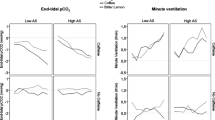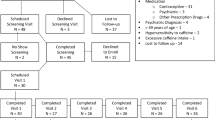Abstract
The objective of this study is to determine the impact of expectation associated with placebo and caffeine ingestion. We used a three-armed, randomized, double-blind design. Two three-armed experiments varying instruction (true, false, control) investigated the role of expectations of changes in arousal (blood pressure, heart rate), subjective well-being, and reaction time (RT). In Experiment 1 (N = 45), decaffeinated coffee was administered, and expectations were produced in one group by making them believe they had ingested caffeinated coffee. In Experiment 2 (N = 45), caffeinated orange juice was given in both experimental groups, but only one was informed about the true content. In Experiment 1, a significant effect for subjective alertness was found in the placebo treatment compared to the control group. However, for RT and well-being no significant effects were found. In Experiment 2, no significant expectancy effects were found. Caffeine produced large effects for blood pressure in both treatments compared to the control group, but the effects were larger for the false information group. For subjective well-being (alertness, calmness), considerable but nonsignificant changes were found for correctly informed participants, indicating possible additivity of pharmacologic effect and expectations. The results tentatively indicate that placebo and expectancy effects primarily show through introspection.
Similar content being viewed by others
References
Ader, R. (1993). Conditioned responses in pharmacotherapy research. Psychological Medicine, 23, 297–299.
Ader, R. (2000). The placebo effect: If it’s all in your head, does that mean you only think you feel better? Advances in Mind Body Medicine, 16, 7–11.
Barone, J. J., & Roberts, H. R. (1996). Caffeine consumption. Food and Chemical Toxicology, 34, 119–129.
Beecher, H. K. (1955). The powerful placebo. Journal of the American Medical Association, 159, 1602–1606.
Cohen, J. (1988). Statistical Power Analysis for the Behavioral Sciences. Hillsdale, NJ: Lawrence Erlbaum Associates, Inc.
Fillmore, M., Mulvihill, L. E., & Vogel-Sprott, M. (1994). The expected drug and its expected effect interact to determine placebo responses to alcohol and caffeine. Psychopharmacology, 115, 383–388.
Fillmore, M., Roach, E., & Rice, J. (2002). Does caffeine counteract alcohol-induced impairment? The ironic effects of expectancy. Journal of Studies on Alcohol, 63, 745–754.
Fillmore, M. A., & Vogel-Sprott, M. (1992). Expected effect of caffeine on motor performance predicts the type of response to placebo. Psychopharmacology, 106, 209–214.
Flaten, M. A., & Blumenthal, T. D. (1999). Caffeine-associated stimuli elicit conditioned responses: An experimental model of the placebo effect. Psychopharmacology, 145, 105–112.
Garrett, B. E., & Griffiths, R. R. (1998). Physical dependence increases the relative reinforcing effects of caffeine versus placebo. Psychopharmacology, 139, 195–202.
Haour, F. (2005). Mechanisms of the placebo effect and of conditioning. Neuroimmunomodulation, 12, 195–200.
Hirt, E. R., Lynn, S. J., Payne, D. G., Krackow, E., & McCrea, S. M. (1999). Expectancies and memory: Inferring the past from what must have been. In I. Kirsch (Ed.), Howexpectancies shape experiences, pp. 93–125. Washington, DC: American Psychological Association.
Hróbjartsson, A. (2002). What are the main methodological problems in the estimation of placebo effects? Journal of Clinical Epistemiology, 55, 430–435.
Hróbjartsson, A., & Gøtzsche, P. C. (2001). Is the placebo powerless? An analysis of clinical trials comparing placebo with no treatment. New England Journal of Medicine, 344, 1594–1602.
James, J. E., Gregg, M. E., Kane, M., & Harte, F. (2005). Dietary caffeine, performance and mood: Enhancing and restorative effects after controlling for withdrawal reversal. Neuropsychology, 52, 1–10.
Keijzers, G. B., De Galan, B. E., Tack, C. J., & Smits, P. (2002). Caffeine can decrease insulin sensitivity in humans. Diabetes Care, 25, 364–369.
Kirsch, I. (1999). How expectancies shape experience. Washington, DC: American Psychological Association.
Kirsch, I., & Weixel, L. J. (1988). Double-blind versus deceptive administration of a placebo. Behavioral Neuroscience, 102, 319–323.
Lotshaw, S.C., Bradley, J. R., & Brooks, L. R. (1996). Illustrating caffeine’s pharmacological and expectancy effects utilizing a balanced placebo design. Journal of Drug Education, 26, 13–24.
Mikalsen, A., Bertelsen, B., & Flaten, M. A. (2001). Effects of caffeine, caffeine-associated stimuli, and caffeine-related information on physiological and psychological arousal. Psychopharmacology, 157, 373–380.
Moerman, D. E., & Jonas, W. B. (2002). Deconstructing the placebo effect and finding meaning response. Annals of Internal Medicine, 136, 471–476.
Papakostas, Y. G., & Dras, M. D. (2001). Placebos, placebo effect, and the response to the healing situation: The evolution of a concept. Epilepsia, 42, 1614–1625.
Quinlan, P., Lane, J., & Aspinall, L. (1997). Effects of hot tea, coffee and water ingestion on physiological responses and mood: The role of caffeine, water and beverage type. Psychopharmacology, 134, 164–173.
Schneider, R. (in press). The psychology of the placebo effect: Exploring meaning from a functional account. Journal of Mind and Behavior. Manuscript accepted for publication.
Stewart-Williams, S., & Podd, J. (2004). The placebo effect: Dissolving the expectancy versus conditioning debate. Psychological Bulletin, 130, 324–340.
Steyer, R., Schwenkmezger, P., Notz, P., & Eid, M. (1997). Mehrdimensionaler Befindlichkeitsfragebogen [Multidimensional well-being questionnaire] Göttingen: Hogrefe.
Temple, R., & Ellenberg, D. M. (2000). Placebo-controlled trials and active-control trials in the evaluation of new treatments. Part 1: Ethical and scientific issues. Annals of Internal Medicine, 133, 455–463.
Vase, L., Riley, J. L., & Price, D. D. (2002). A comparison of placebo effects in clinical analgesic trials versus studies of placebo analgesia. Pain, 99, 443–452.
Vase, L., Robinson, M. E., Verne, G. N., & Price, D. D. (2003). The contributions of suggestion, desire, and expectation to placebo effects in irritable bowel syndrome patients. An empirical investigation. Pain, 105, 17–25.
Verne, G. N., Robinson, M. E., Vase, L., & Price, D. D. (2003). Reversal of visceral and cutaneous hyperalgesia by local rectal anesthesia in irritable bowel syndrome (IBS) patients. Pain, 105, 223–230.
Walach, H., & Jonas, W. B. (2004). Placebo research: The evidence base for harnessing self-healing capacities. Journal of Alternative and Complementary Medicine, 10, 103–112.
Walach, H., Schmidt, S., Bihr, Y.-M., & Wiesch, S. (2001). The effects of a caffeine placebo and experimenter expectation on blood pressure, heart rate, well-being, and cognitive performance. European Psychologist, 6, 15–25.
Walach, H., Schmidt, S., Dirhold, T., & Nosch, S. (2002). The effects of a caffeine placebo and suggestion on blood pressure, heart rate, well-being and cognitive performance. International Journal of Psychophysiology, 43, 247–260.
Wickrameskera, I. (1980). A conditioned response model of the placebo effect: Predictions from the model. Biofeedback and Self Regulation, 5, 5–18.
Zimmerman, P. & Fimm, B. (1992). Testbatterie zur Aufmerksamkeitsprüfung (TAP) [Test battery for attentional performance]. Freiburg, Germany: Psychologische Testsysteme.
Zwyghuizen-Doorenbos, A., Roehrs, T. A., Lipschutz, L., Timms, V., & Roth, T. (1990). Effects of caffeine on alertness. Psychopharmacology, 100, 36–39.
Author information
Authors and Affiliations
Corresponding author
Rights and permissions
About this article
Cite this article
Schneider, R., Grüner, M., Heiland, A. et al. Effects of expectation and caffeine on arousal, well-being, and reaction time. Int. J. Behav. Med. 13, 330–339 (2006). https://doi.org/10.1207/s15327558ijbm1304_8
Issue Date:
DOI: https://doi.org/10.1207/s15327558ijbm1304_8




